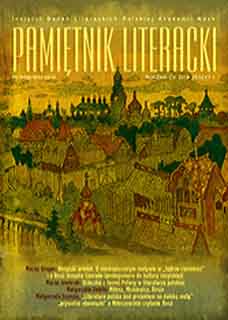Miłosz, Mickiewicz, Rosja
Miłosz, Mickiewicz, and Russia
Author(s): Małgorzata ZemłaSubject(s): Literary Texts
Published by: Instytut Badań Literackich Polskiej Akademii Nauk
Keywords: Czesław Miłosz; Czesław Miłosz’s essay “Russia"; Adam Mickiewicz; Adam Mickiewicz’s “Forefathers’ Eve Part III"; das Unheimliche
Summary/Abstract: he objective of the article is an analysis of Czesław Miłosz’s essay “Russia (Rosja)” taking into consideration its most important pre-text, Adam Mickiewicz’s “Item (Ustęp)” to “Forefathers’ Eve Part III (Dziady, część III).” The starting point of Miłosz’s text is a contrastive comparison of Polish (or European) and Russian culture and mentality. The communicative situation outlined in this manner is a reflection of Polish-Russian political state of affairs at the time of the essay’s composition which can be described as a “double-bind” arrangement. The subject of the piece by Miłosz adopts in this arrangement the role of a victim, at the same time identifying itself with its national community, while Russia performs the role of an oppressor. In psychiatric descriptions of double bind the preservation of the persecutor’s negative image is necessary for the victim to retain its internal integrity. The essay’s subject is therefore trying to fulfil its role referring to negative stereotype about Russia, and in this stereotype is looking for an explanation for its own “obsession” about the country. On the other hand, Miłosz in “Russia” carries out a kind of literary psychoanalysis which offers possibilities of going beyond the uncompromising polarisation of the Poles and the Russians. Indicating the Gnostic roots of Russian culture, the poet forms bases of metadiscourse about Russia since cultural heterodoxy is by no means only Russian phenomenon. It is rather the reverse: Gnostic influences are seen in European culture with a naked eye, especially in the 20th century. As a result of this psychoanalytical process, Russia is manifest in Miłosz’s essay as an embodiment of Freud’s “the uncanny” (“das Unheimliche”). According to Sigmund Freud, “the uncanny” terrifies us not because it is alien but contrary to that, because it is a part of “our” which we have denied and for that reason it causes fear. This truth, however, is unpronounced by the essay’s subject and in Miłosz’s piece it remains somewhat hidden in the shadow of stereotypical images about Russia.
Journal: Pamiętnik Literacki. Czasopismo kwartalne poświęcone historii i krytyce literatury polskiej
- Issue Year: 2014
- Issue No: 1
- Page Range: 45-83
- Page Count: 39
- Language: Polish

